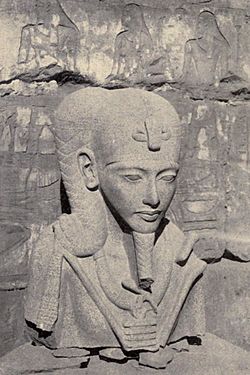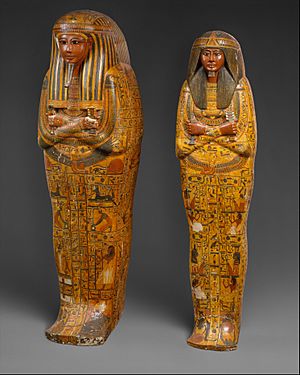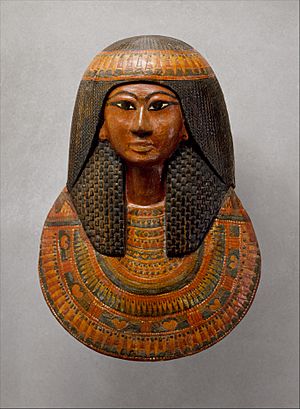Khonsu facts for kids
Quick facts for kids Khonsu |
|
|---|---|
| Egyptian god of the moon | |

Granite statue of the Egyptian god Khonsu, late 18th Dynasty, New Kingdom. Now in Cairo Museum
|
|
| Major cult center | Thebes |
| Symbol | the moon disk, the sidelock, falcon, crook and flail, was-scepter |
| Parents | Amun and Mut |
Khonsu (also spelled Chonsu or Khonshu) was an important Ancient Egyptian god of the moon. His name means "traveller," which makes sense because the moon travels across the night sky. Khonsu was believed to help mark the passage of time, along with the god Thoth. He was also thought to be very important in creating new life for all living things. In the ancient city of Thebes, Khonsu was part of a special family group called the "Theban Triad." His mother was Mut and his father was Amun.
Who Was Khonsu?
Khonsu's name, meaning "traveller," shows his connection to the moon moving through the night sky. He also had other titles like "Embracer," "Pathfinder," and "Defender." People believed he watched over those who traveled after dark. As the god of light in the night, Khonsu was asked to protect people from wild animals. He was also known for his power to help with healing illnesses.
How Khonsu Looked
In ancient Egyptian art, Khonsu usually looks like a mummy. He often has a special sidelock of hair, which was a symbol of childhood. He also wears a menat necklace and holds a crook and flail, which are symbols of royalty. Khonsu was closely linked to other divine children, like Horus and Shu. Sometimes, he is shown with the head of an eagle or a falcon, similar to Horus. When shown this way, he wears both the sun disk and the crescent moon on his head. This look connects him to his roles as a protector and a healer.
Khonsu's Importance and Temples
Khonsu is mentioned in very old Egyptian texts, such as the Pyramid Texts and Coffin Texts. In these early writings, he sometimes appears as a fierce god. However, he became much more important during the New Kingdom period. During this time, he was even called the "Greatest God of the Great Gods."
Much of the building work at the huge temple complex in Karnak focused on Khonsu, especially during the Ramesside period (part of the Nineteenth Dynasty). His temple at Karnak is still very well preserved today. On one of its walls, there is a creation myth that describes Khonsu as a giant snake. This snake was believed to fertilize the Cosmic Egg to help create the world.
Khonsu's fame as a healer spread beyond Egypt. People worshipped him in other places like Memphis, Hibis, and Edfu. There are stories about his healing powers. For example, a princess from a place called Bekhten was instantly cured of her illness when an image of Khonsu arrived. King Ptolemy IV was also cured of an illness. After that, he called himself "Beloved of Khonsu Who Protects His Majesty and Drives Away Evil Spirits."
See also
 In Spanish: Jonsu para niños
In Spanish: Jonsu para niños
 | Mary Eliza Mahoney |
 | Susie King Taylor |
 | Ida Gray |
 | Eliza Ann Grier |



